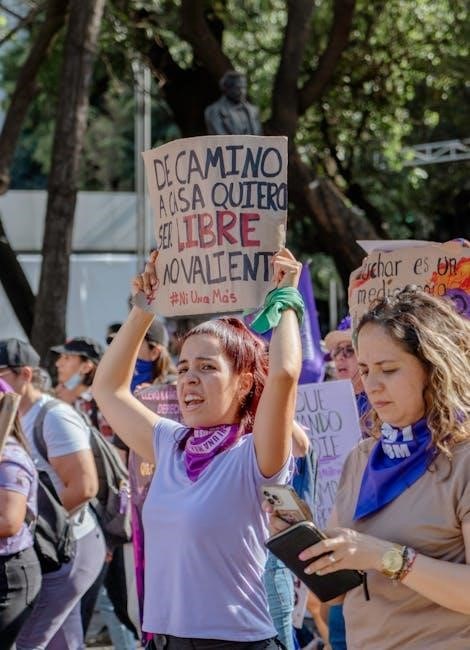
how america got mean pdf free
David Brooks’ insightful article explores America’s cultural shift toward meanness, driven by economic inequality, demographic changes, and media amplification, urging a return to empathy and kindness.
Overview of the Article’s Main Thesis
David Brooks’ article examines the cultural shift in America, highlighting how economic inequality, demographic changes, and media amplification have fostered a mean-spirited society. He argues that meanness stems from fear, alienation, and division, fueled by political polarization and social media. Brooks emphasizes the need for empathy and collective responsibility to reverse this trend, urging a return to kindness and unity as essential for a healthier society.
Importance of Understanding the Cultural Shift in America
Understanding America’s cultural shift toward meanness is crucial for addressing its societal implications. Economic inequality, demographic changes, and media-driven polarization have created a culture of contempt and division. Recognizing these factors is essential for fostering empathy and unity. Ignoring this shift risks further erosion of civil discourse and social cohesion, undermining democracy and collective well-being. Addressing these challenges is vital for reclaiming a kinder, more compassionate society.

The Cultural Shift Toward Meanness
America’s cultural shift toward meanness is marked by rising rudeness, division, and contempt, fueled by economic inequality, demographic changes, and media amplification of outrage and hostility.
Historical Context of American Culture
America’s cultural journey reflects a transformation from unity to division. Historically, the nation embraced ideals of freedom and equality, but recent decades reveal a decline into meanness, fueled by economic disparity and social fragmentation. The rise of outrage culture and political polarization has eroded civil discourse, echoing past eras of upheaval. This shift underscores a departure from foundational values, highlighting the urgent need for cultural renewal and empathy.
The Role of Media and Technology in Amplifying Meanness
Media and technology have become significant catalysts for the spread of meanness in American culture. Social platforms prioritize controversial content, creating echo chambers that amplify divisive rhetoric. The rise of the “outrage industrial complex” profits from polarization, fostering a culture of contempt. Algorithms drive engagement through negativity, eroding empathy and deepening societal divides. This digital landscape has transformed public discourse, making meanness a defining feature of modern communication.
Social Media’s Impact on Interpersonal Relations
Social media has profoundly altered interpersonal relations, fostering a culture of contempt and division. Platforms encourage instant reactions, often prioritizing outrage over thoughtful dialogue. The anonymity of online interactions emboldens individuals to express hostility they might refrain from in person. This shift has eroded empathy, turning disagreements into personal attacks and deepening societal fractures. The result is a decline in meaningful connections and a rise in virtual animosity.

Economic Inequality and Its Role in Fostering Meanness
Rising wealth disparities in America have fueled resentment and mistrust, creating an environment where economic insecurity breeds social division and meanness among individuals and communities alike.
The Widening Wealth Gap in America
America’s wealth gap has grown significantly, with the top quintile holding vast economic power while millions face insecurity. This divide fosters fear, alienation, and pessimism, eroding social cohesion and fueling meanness. Rising inequality undermines trust and shared prosperity, leaving many feeling left behind in an economy that increasingly favors the wealthy, deepening societal fractures and mistrust among citizens.
How Economic Insecurity Shapes Social Behavior
Economic insecurity fuels stress, desperation, and aggression, as individuals struggle to meet basic needs. This instability erodes trust, fostering a culture of competition over cooperation. People may become more cynical, blaming others for their struggles, leading to scapegoating of minorities and the vulnerable. Such behaviors reflect a broader societal fracture, where financial instability amplifies meanness and erodes empathy, deepening divisions and hostility.
The Decline of Empathy in American Society
America’s growing meanness reflects a decline in empathy, as individuals increasingly view opponents as worthless rather than merely wrong, fostering contempt and division across society.
Psychological Factors Contributing to Reduced Empathy
Psychological factors like increased stress, anxiety, and polarization contribute to declining empathy. Economic insecurity fosters self-focused behaviors, reducing compassion for others. Social media amplifies divisiveness, desensitizing individuals to others’ struggles. These factors collectively erode the ability to understand and share feelings, leading to a culture of contempt and meanness in American society. Addressing these psychological drivers is crucial to rebuilding empathy and kindness.
The Role of Education in Promoting or Reducing Empathy
Education plays a dual role in shaping empathy. While it can foster understanding and compassion through diverse perspectives, curricula often prioritize achievement over emotional intelligence. This shift can reduce empathy, as students focus on individual success rather than collective well-being. Additionally, the lack of empathy-building programs in schools exacerbates the decline, highlighting the need for educational reforms that nurture both intellect and compassion to address America’s growing meanness.

The Rise of Outrage Culture
The “outrage industrial complex” thrives by fueling anger and contempt, turning disagreement into hatred and profit, eroding civil discourse and fostering a culture of division.
The Outrage Industrial Complex
The outrage industrial complex fuels division by exploiting anger for profit, creating a culture of contempt where disagreement becomes hatred. Media, politicians, and activists amplify extremes to polarize society, eroding empathy and fostering hostility. This system thrives on algorithms and emotional manipulation, deepening societal fractures and undermining constructive dialogue, as outrage becomes a commodity that divides Americans and stifles unity.
How Politics Fuels Divisiveness and Meanness
Politics has become a significant driver of divisiveness, with leaders often using divisive rhetoric to mobilize support. This fosters an “us versus them” mentality, reducing empathy and increasing hostility. The exploitation of fear and anger for political gain further polarizes society, creating a toxic environment where compromise is seen as weakness, and meanness becomes a tool to assert dominance and control over the narrative.

Demographic Changes and Their Impact
America’s shifting demographics, with growing diversity, have sparked anxiety among some, fueling polarization and meanness as cultural and racial tensions intensify amid economic insecurity.
Shifts in America’s Demographic Landscape
America’s demographic landscape is rapidly evolving, transitioning from a white-dominated nation to a more diverse society. This shift has sparked anxiety among millions of white Americans, fueling cultural tensions and a sense of disorientation. The changing demographics, coupled with economic insecurity, have intensified fears and polarization, contributing to a broader cultural meanness and divisiveness. These changes are reshaping American identity and societal values, amplifying divisions and conflict.
How Diversity and Division Intertwine
Diversity and division are deeply intertwined in America, as demographic shifts create cultural and social fault lines. While diversity brings richness, it also fosters division, as differing identities and values clash. This tension is amplified by economic inequality and political polarization, leading to a culture of contempt and meanness. The interplay between diversity and division highlights the challenges of building unity in a fragmented society, where differences often overshadow shared humanity.

The Role of Politics in Shaping a Mean-Spirited Culture
Politics fuels divisiveness through polarization, rhetoric, and the outrage industrial complex, creating a toxic environment where differing views escalate into personal attacks and societal contempt.
Polarization and the Erosion of Civil Discourse
Polarization has deepened political divides, turning disagreements into moral battles. The media amplifies extreme voices, fostering contempt for opposing views. This erosion of civil discourse discourages empathy, reducing complex issues to simplistic, divisive rhetoric. As a result, Americans increasingly view those with differing opinions as enemies, rather than fellow citizens deserving respect and understanding.
Leadership’s Role in Promoting or Mitigating Meanness
Leaders play a crucial role in shaping cultural tone. When leaders employ divisive rhetoric, they amplify meanness and polarization. Conversely, compassionate leadership can foster empathy and unity. The choices of those in power significantly influence societal behavior, making their responsibility to promote kindness and understanding paramount in healing America’s mean-spirited culture.

Historical Parallels and Lessons
America’s history reveals periods of cultural upheaval, such as the Great Depression and 1960s unrest, where economic stress and social division fueled meanness, yet resilience prevailed.
Previous Eras of Social and Cultural Upheaval
America has faced numerous periods of social and cultural upheaval, such as the Civil Rights Movement and the Great Depression, where economic disparities and social tensions led to increased meanness and division. These historical events highlight how cultural shifts can be driven by economic inequality, demographic changes, and political polarization, creating environments where meanness and hostility thrive;
Learning from Past Mistakes to Build a Kinder Future
By examining past eras of social upheaval, America can learn valuable lessons to foster kindness and unity. Historical patterns reveal how economic inequality, cultural shifts, and political polarization fueled meanness. Recognizing these dynamics allows society to address root causes, promote empathy, and create systemic changes. Collective responsibility and intentional efforts to heal divisions can pave the way for a more compassionate and inclusive future.

Addressing the Issue of Meanness
Addressing meanness requires fostering empathy, promoting civil discourse, and tackling economic inequality. Education, policy reforms, and collective responsibility are key to creating a more compassionate society.
Individual and Collective Responsibility
Addressing meanness demands both individual and collective action. Individuals must practice empathy and kindness, while society must promote inclusive policies and education. By fostering a culture of responsibility, we can mitigate meanness and build a more compassionate America. Collective efforts, such as community initiatives and policy reforms, are essential to creating lasting change and encouraging a shift toward kindness.
Policies and Initiatives to Promote Kindness and Empathy
Implementing policies that foster kindness and empathy is crucial. Schools can integrate emotional intelligence programs, while governments can support community projects that encourage unity. Media literacy campaigns can combat harmful narratives, promoting respectful dialogue. By prioritizing empathy in public policy, society can cultivate a culture of understanding and reduce meanness. Such initiatives are vital for healing societal divides and nurturing compassion.
America’s descent into meanness demands urgent change. By fostering empathy, unity, and kindness, we can reclaim our compassionate spirit and build a brighter, more inclusive future together.
Recap of Key Points
Key factors driving America’s meanness include rising economic inequality, demographic shifts, media amplification of outrage, and declining empathy. These elements foster division, erode civil discourse, and fuel a culture of contempt. Addressing this requires collective efforts to promote kindness, understanding, and unity, ensuring a path toward a more compassionate society for future generations to thrive.
A Path Forward for a Kinder America
A kinder America requires collective efforts to rebuild empathy, encourage civil discourse, and address economic disparities. By fostering understanding through education, promoting inclusivity, and supporting policies that reduce inequality, Americans can create a culture of compassion. Individual actions, such as practicing kindness and engaging in meaningful conversations, are essential steps toward healing societal divisions and restoring unity.

Additional Resources
The free PDF offers insights into America’s cultural shift. David Brooks’ article in The Atlantic and Steve Fraser’s historical analysis provide deeper understanding. Explore these resources online.
Recommended Reading and Further Study
Explore David Brooks’ article in The Atlantic, “How America Got Mean,” for a deeper dive into cultural shifts. Steve Fraser’s “Wall Street: A Cultural History” offers historical context. Download the free PDF online for insights into economic inequality and demographic changes. Additional resources include academic studies and online articles available on platforms like Edutopia and the Fraser Institute, providing a comprehensive understanding of America’s cultural evolution.
Where to Find the Full PDF and Related Materials
The full PDF of “How America Got Mean” by David Brooks can be downloaded for free from the Atlantic Monthly’s official website or through academic platforms like Edutopia. Additional resources, including related articles and studies, are available on the Fraser Institute and other educational sites. Visit these platforms to access comprehensive materials and gain deeper insights into the topic.
Leave a Reply
You must be logged in to post a comment.